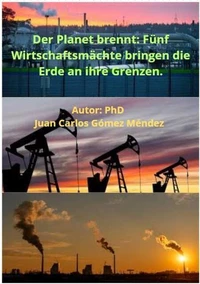Climate Exodus: A Statistical Analysis of Displacements and Projections Towards an Uncertain Future. Research published in English, #4
Par :Formats :
Disponible dans votre compte client Decitre ou Furet du Nord dès validation de votre commande. Le format ePub est :
- Compatible avec une lecture sur My Vivlio (smartphone, tablette, ordinateur)
- Compatible avec une lecture sur liseuses Vivlio
- Pour les liseuses autres que Vivlio, vous devez utiliser le logiciel Adobe Digital Edition. Non compatible avec la lecture sur les liseuses Kindle, Remarkable et Sony
 , qui est-ce ?
, qui est-ce ?Notre partenaire de plateforme de lecture numérique où vous retrouverez l'ensemble de vos ebooks gratuitement
Pour en savoir plus sur nos ebooks, consultez notre aide en ligne ici
- FormatePub
- ISBN8227932372
- EAN9798227932372
- Date de parution16/08/2024
- Protection num.pas de protection
- Infos supplémentairesepub
- ÉditeurBig Dog Books, LLC
Résumé
Climate change is generating an increasingly worrying phenomenon: climate change displacement, the forced or voluntary migration of people who are forced to leave their homes and livelihoods due to the impacts of climate change. This research seeks to analyze this phenomenon on the planet using a timeline, a statistical forecast model, and a Shapiro-Wilk normality test. The Shapiro-Wilk test yielded a positive result for the normality of the data, indicating that the linear regression technique is suitable for analyzing the relationship between the variables.
The regression model shows an upward trend in climate change displacement over the next seven years. A significant increase in the number of people who will be forced to leave their homes due to the impacts of climate change is expected. The research results highlight the urgency of taking concrete action to mitigate climate change and reduce its impact on vulnerable communities. It is essential to guarantee access to humanitarian assistance, protection and basic rights for people displaced by climate change.
The regression model shows an upward trend in climate change displacement over the next seven years. A significant increase in the number of people who will be forced to leave their homes due to the impacts of climate change is expected. The research results highlight the urgency of taking concrete action to mitigate climate change and reduce its impact on vulnerable communities. It is essential to guarantee access to humanitarian assistance, protection and basic rights for people displaced by climate change.
Climate change is generating an increasingly worrying phenomenon: climate change displacement, the forced or voluntary migration of people who are forced to leave their homes and livelihoods due to the impacts of climate change. This research seeks to analyze this phenomenon on the planet using a timeline, a statistical forecast model, and a Shapiro-Wilk normality test. The Shapiro-Wilk test yielded a positive result for the normality of the data, indicating that the linear regression technique is suitable for analyzing the relationship between the variables.
The regression model shows an upward trend in climate change displacement over the next seven years. A significant increase in the number of people who will be forced to leave their homes due to the impacts of climate change is expected. The research results highlight the urgency of taking concrete action to mitigate climate change and reduce its impact on vulnerable communities. It is essential to guarantee access to humanitarian assistance, protection and basic rights for people displaced by climate change.
The regression model shows an upward trend in climate change displacement over the next seven years. A significant increase in the number of people who will be forced to leave their homes due to the impacts of climate change is expected. The research results highlight the urgency of taking concrete action to mitigate climate change and reduce its impact on vulnerable communities. It is essential to guarantee access to humanitarian assistance, protection and basic rights for people displaced by climate change.























